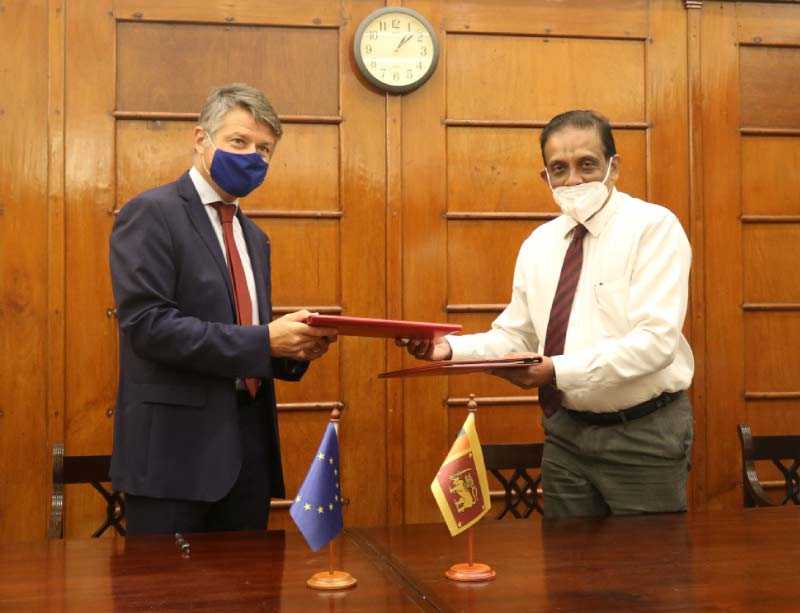Thursday Feb 19, 2026
Thursday Feb 19, 2026
Thursday, 14 January 2021 01:44 - - {{hitsCtrl.values.hits}}

Treasury Secretary S.R. Attygalle with EU Ambassador to Sri Lanka Denis Chaibi at the signing ceremony yesterday
The European Union (EU) yesterday announced the signing of three grants worth EUR 35.75 million (Rs. 8.26 billion), which will support Sri Lanka’s justice sector, help improve food safety, and strengthen efforts to mitigate climate change.
The grants were signed on behalf of the Government by Secretary to the Treasury S.R. Attygalle and were presented by the Ambassador of the Delegation of the European Union to Sri Lanka Denis Chaibi.
Appreciating the continued close collaboration and the very cordial partnership and support for Sri Lanka extended by the EU, the Treasury Secretary said that these grants would reinforce the Government’s efforts to strengthen the justice sector, to reduce greenhouse gas emissions in Sri Lanka and to improve food safety and quality targeting exports.
“These three grants are a tangible pledge of support by the European Union to Sri Lanka targeting three priority areas,” said Ambassador Chaibi. “The coronavirus pandemic has underscored the importance of strengthening a country’s justice system to ensure citizens are able to access justice in a timely, effective, and fair manner.”
Ambassador Chaibi noted that EU support to improving food safety would benefit producers and consumers alike, while boosting the potential export of organic agricultural products to the EU and other markets. He added that the EU and Sri Lanka would continue to work together to tackle the common challenges of climate change, a major EU priority.
The EUR 18 million (Rs. 4.16 billion) Justice Sector Support program, designed in close consultation with the relevant actors and institutions, will focus on providing capacity development and technical assistance. The overarching goal is to increase efficiency and effectiveness, reduce caseloads in the courts, and in particular to improve access to justice. The program will be mainly implemented by UNDP and UNICEF.
EUR 10 million (Rs. 2.31 billion) will help improve food safety, quality, and promote organic agriculture. The components, to be implemented by FAO and UNIDO, will strengthen the competitiveness of the agriculture sector through the adoption of good agricultural and hygienic practices, an updated risk-based food control system, and increased consumer awareness.
Implementing partner GIZ (Germany) will also support the local organic market, including small and medium-sized businesses to produce at higher volumes and better quality. The standards required to access major EU markets will be promoted through the National Organic Control Union and the Export Development Board.
The EUR 7.75 million (Rs. 1.79 billion) Reducing Greenhouse Gas Emissions in the Industrial Sector project, implemented by UNIDO, is in response to a request by the Ministries of Environment, Power, and Industry, to support a shift towards a competitive, resource efficient, low carbon, and climate resilient industrial sector in Sri Lanka.
It will help large, medium, and small industries to increase their environmental compliance and reduce emissions, and enable the Government to achieve its international commitments pledged during the Paris Agreement to mitigate climate change.